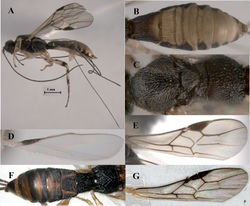Ondigus
| Notice: | This page is derived from the original publication listed below, whose author(s) should always be credited. Further contributors may edit and improve the content of this page and, consequently, need to be credited as well (see page history). Any assessment of factual correctness requires a careful review of the original article as well as of subsequent contributions.
If you are uncertain whether your planned contribution is correct or not, we suggest that you use the associated discussion page instead of editing the page directly. This page should be cited as follows (rationale):
Citation formats to copy and paste
BibTeX: @article{Zaldívar-Riverón2012ZooKeys164, RIS/ Endnote: TY - JOUR Wikipedia/ Citizendium: <ref name="Zaldívar-Riverón2012ZooKeys164">{{Citation See also the citation download page at the journal. |
Ordo: Hymenoptera
Familia: Braconidae
Name
Ondigus Braet, Barbalho & van Achterberg – Wikispecies link – Pensoft Profile
- Ondigus Braet, Barbalho & van Achterberg, 2003: 109–111.
Type species
Ondigus bicolor Braet, Barbalho & van Achterberg
Diagnosis
This genus distinguishes from the remaining doryctine genera by having the following combination of features: (1) first six metasomal tergites sculptured, fourth to sixth granulate (Figs 6B,F); (2) suture between the second and third metasomal tergites wide, deep, scrobiculate and slightly sinuate (Figs 6B,F); (3) third metasomal tergite with a deep, scrobiculate transverse groove (Figs 6B,F); (4) first subdiscal cell of fore wing open at apex (Figs 6E,G); (5) hind coxa with a distinct basoventral tooth; hind wing vein M+CU approximately the same length of vein 1M (Figs 6E,G); (6) all femora with subbasal tubercles (Fig. 6A).
Description
Moderate size, female 5.6–6.1 mm, male 4.2 mm; eyes large, moderately emarginated opposite antennal sockets; maxillary palpi 5-segmented, labial palpi 4-segmented; face densely setose; occipital carina present and complete; hypoclypeal depression elliptic; clypeus short and wide; malar suture absent; mesosoma setose and mostly coriaceous; mesoscutum declivous anteriorly; notauli distinct anteriorly, scrobiculate, obscured at half of mesoscutum in a longitudinally rugose area; prepectal carinae present; metapleural flange present; all femora with a subbasal protuberance; fore tibia with a row six to eight spines along anterior edge; hind coxa granulate, pilose, with a basoventral tooth; only known male with pterostigma on hind wing; vein m-cu of fore wing interstitial or slightly antefurcal to vein 2RS; vein 1cu-a considerably postfurcal to vein 1M; vein r-m of fore wing present; second submarginal cell of fore wing long; first subdiscal cell of fore wing open at apex; hind wing vein M+CU equal to or slightly longer than vein 1M; first metasomal tergite about 1.1–1.2 times longer than its apical width; suture between second and third metasomal tergite wide, deep, scrobiculate and slightly sinuate; third metasomal tergite with a deep, scrobiculate transverse groove; basal sternal plate (acrosternite) of first metasomal tergite about 0.2 length of tergum.
Distribution
French Guyana, Mexico.
Remarks
The new species of Ondigus described here differs in some of the morphological features originally proposed by Braet et al. (2003)[1] to define the genus. These features include a striate vertex, propodeum without longitudinal median carinae and areola, and second metasomal tergite without a pair of sublateral depressions. The above species and Ondigus bicolor, however, share a number of diagnostic features on wing venation, legs and sculpture of metasomal tergites. The majority rule consensus tree derived from the Bayesian analysis performed recovered Ondigus bicolor and our new species in separate clades; the relationships involved, however, were weakly supported. Based on the above morphological similarities and the unclear phylogenetic relationships obtained, we have decided to place the new species within Ondigus until additional help us to confirm the conspecificity of the taxa involved.
Key to described species of Ondigus
Taxon Treatment
- Zaldívar-Riverón, A; Martínez, J; Ceccarelli, F; Shaw, S; 2012: Five new species of the genera Heerz Marsh, Lissopsius Marsh and Ondigus Braet, Barbalho and van Achterberg (Braconidae, Doryctinae) from the Chamela-Cuixmala biosphere reserve in Jalisco, Mexico ZooKeys, 164: 1-23. doi
Other References
- ↑ Braet Y, Barbalho S, Achterberg C v (2003) Description of four new genera and nine new species of Doryctinae (Hymenoptera: Braconidae) from French Guyana. Zoologische Mededelingen 77: 93-125.
Images
|
